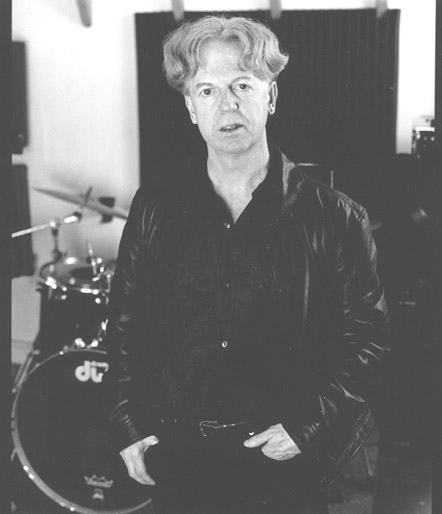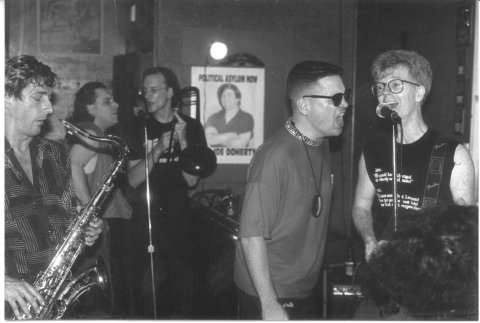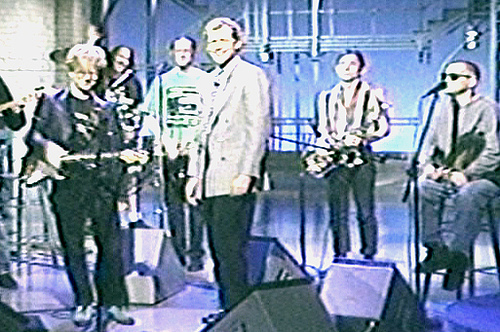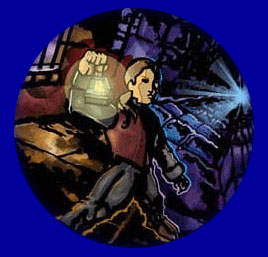INTERVIEW WITH SIRIUS DISORDER DJ - LARRY KIRWAN OF "CELTIC CRUSH"
PART 1 of 3
Larry Kirwan hosts "Celtic Crush" on Sirius Disorder (ch. 32) which airs:
Saturdays 10 am - 1 pm ET
Rebroadcast Tuesdays 10 pm - 1 am ET
The Interview: Larry Kirwan and Black 47: The Story So Far....
“Who is Larry Kirwan” and how did he go from being a boy in Wexford to an accomplished musician, playwright, author, and now disc jockey on Sirius?
 Well, it’s a long story dealt with in greater detail in my “memoir” Green Suede Shoes. Basically, I grew up in Wexford, a small town in the Southeast corner of Ireland. It was a singular place – almost seems like a different universe, looking back. I had great roots there but I had an insatiable curiosity and a longing for adventure. I came to New York City and found it a very fertile ground in which to experiment. I always left myself open to chance and, in the course of some decades, was able to try my hand at various types of artistic endeavor. I feel very fortunate to host a show on Sirius, Celtic Crush, where I’m given a free hand to indulge in new forms of creativity.
Well, it’s a long story dealt with in greater detail in my “memoir” Green Suede Shoes. Basically, I grew up in Wexford, a small town in the Southeast corner of Ireland. It was a singular place – almost seems like a different universe, looking back. I had great roots there but I had an insatiable curiosity and a longing for adventure. I came to New York City and found it a very fertile ground in which to experiment. I always left myself open to chance and, in the course of some decades, was able to try my hand at various types of artistic endeavor. I feel very fortunate to host a show on Sirius, Celtic Crush, where I’m given a free hand to indulge in new forms of creativity.
How did Black 47 start? Who’s in the band?
 Black 47’s birth is pretty well documented – just google the name - but Chris Byrne and I began the band in the working class Irish bars of the North Bronx in October ’89. Chris left around seven years ago to concentrate on his own band, Seanchai and the Unity Squad – whose music you can frequently hear on Celtic Crush. Other “foundation” members are Fred Parcells (trombone); Geoffrey Blythe (saxophones), Thomas Hamlin (drums). Joseph Mulvanerty stepped in when Chris left on uilleann pipes and Joseph Burcaw (Bearclaw) joined recently when Andrew Goodsight departed to pursue a solo career.
Black 47’s birth is pretty well documented – just google the name - but Chris Byrne and I began the band in the working class Irish bars of the North Bronx in October ’89. Chris left around seven years ago to concentrate on his own band, Seanchai and the Unity Squad – whose music you can frequently hear on Celtic Crush. Other “foundation” members are Fred Parcells (trombone); Geoffrey Blythe (saxophones), Thomas Hamlin (drums). Joseph Mulvanerty stepped in when Chris left on uilleann pipes and Joseph Burcaw (Bearclaw) joined recently when Andrew Goodsight departed to pursue a solo career.
All the mini-stories in the Black 47 song "Green Suede Shoes" can’t be true – Can they?
I actually had to recite the words to check. I often add fiction to autobiography to come up with what I consider a “third grid” – my favorite form of songwriting. But in this case everything happened pretty much as written. For those who would like to check on the lyrics, go to www.black47.com and hit “Music.” Most of the Black 47 lyrics are there, along with plenty of downloadable songs.
What happened after Black 47's David Letterman appearance?
 Well, again the Green Suede Shoes book is the best reference. In a wild couple of years around 92-94 we hit all those shows: Leno, Letterman, O’Brien and everything else that was current. It was exhilarating and I enjoyed it to the fullest. I guess we were one of the last of old regime before novelty and rampant celebrity took completely over. Now you get your five seconds of fame and are then thrown on the trash heap, but we had a couple of years of mainstream recognition and are still hauled out every March as token Paddies. I had a couple of shots at the top before Black 47’s ascent, when both Turner and Kirwan of Wexford and Major Thinkers (bands that I performed in) gained a lot of FM exposure, and also when my play, Liverpool Fantasy, (if the Beatles had never made it) got extended Off-Broadway. So, I knew the game and was happy to be a part of it. But it didn’t faze me in the least when a lot of the “frothy” attention faded. We had designed Black 47 to be a working band and thus were able to overcome the “slings and arrows of outrageous celebrity-driven fortune.”
Well, again the Green Suede Shoes book is the best reference. In a wild couple of years around 92-94 we hit all those shows: Leno, Letterman, O’Brien and everything else that was current. It was exhilarating and I enjoyed it to the fullest. I guess we were one of the last of old regime before novelty and rampant celebrity took completely over. Now you get your five seconds of fame and are then thrown on the trash heap, but we had a couple of years of mainstream recognition and are still hauled out every March as token Paddies. I had a couple of shots at the top before Black 47’s ascent, when both Turner and Kirwan of Wexford and Major Thinkers (bands that I performed in) gained a lot of FM exposure, and also when my play, Liverpool Fantasy, (if the Beatles had never made it) got extended Off-Broadway. So, I knew the game and was happy to be a part of it. But it didn’t faze me in the least when a lot of the “frothy” attention faded. We had designed Black 47 to be a working band and thus were able to overcome the “slings and arrows of outrageous celebrity-driven fortune.”
Why shouldn’t people mention the song “Come on Eileen” (by Dexy's Midnight Runners) to Geoff Blythe?
Geoff was a founder member of the original Dexy’s Midnight Runners Soul Rebels band. After a number of hits, he and most of the other members left to form The Bureau. Kevin Rowland, the singer, changed to a new style Dexy’s and they had a major hit with “Eileen.” Need I say more?
What was the real story behind the Black 47 song "Maria’s Wedding"?
Maria is one of those aforementioned songs where I combine fact and fiction. But it really sprung from living in Bay Ridge, Brooklyn for a period of time and getting into the whole Italian-American aesthetic. The song is as much about capturing the flavor of the neighborhood as it is about the actual details highlighted. Maria’s Wedding became very popular after we performed it on Letterman and a number of Maria’s claimed to be the “real” one. So, I suppose that’s the real story. Semi-fiction begets “real” fact.
What was the real story behind Black 47 song "Czechoslovakia"?
Now that story is all true except that I was forced to leave out some of the events because they were so wild and complicated that they wouldn’t necessarily be believable in a song. My landlord offered to wipe out my arrears of rent and pay me a considerable sum of money if I went to Czechoslovakia, marry his daughter – but have no sex- and get her to America. As it turned out, I couldn’t go but my friend, Jim No-Coats, did and the result – with a bit of sanitizing is in the song.
Why did you choose to write songs about great Irish heroes like Michael Collins, James Connolly, Bobby Sands, etc?
I have always been political – I was raised in a very charged background, my Grandfather was an Irish Republican who had been on the losing side in Ireland’s civil war. But I never cared for preachy type songs – political or otherwise; and so I generally use allegory. Tell the story of someone’s life and let people craft their own viewpoint from listening. I was raised on rock & roll and Irish traditional songs and wanted to combine them. But I also fancied updating the traditional way of writing in order to get inside the heads of these heroes. I suppose my aim was to introduce a new generation to Connolly, Collins, Sands, etc and make them relevant through rock and a modern perspective.
"Paul Robeson" was not Irish – Why did you choose to write a song about him?
I have really broad interests and tastes. Robeson, to me, was one of the greatest Americans. He is a much more revered figure in Europe and it stunned me when I came here to find out how little is generally known of him. He was a true American hero – football player, actor, singer, political activist/martyr. He has been pretty much expunged from American history because of his left-wing political views, though of late he has had a small resurgence. He was a very brave man who would not desert his principles because of political expediency. Contrast him with the crop of talking heads we now call politicians/statesmen. Someday, perhaps, America and even his own African-Americans will rediscover this inspiring and amazing man. Until then, rock on George, Hillary, Condi…
Who killed Bobby Fuller? And the repercussions of that Black 47 song for you?
Funny, Black 47 performed both "Who Killed Bobby Fuller" and"I Fought The Law" for encores last night. The Bobby Fuller Four was one of the most promising American beat groups. Bobby was killed by someone close to him and the mystery has never been solved. Lester Bangs, the rock critic/writer, and I used to discuss this case quite in the old Bells of Hell. I don’t know who killed Bobby but the case made an interesting backdrop to a breakup story of mine in the East Village. Hence, the song! I don’t know of any particular repercussions except that at one period I would get phone calls in the middle of the night from someone who swore they had the truth. It was pretty creepy, like a voice from the grave.
Why did Chris Byrne split ways with the band? Any chance of seeing a Black 47/Seanchai double bill?
It was time. Chris wanted to do more of his own thing. It was tough at the time – we had been through a lot together and had brought Black 47 from the bars of the North Bronx to national prominence. We had great times together and I often miss his judgment and general take on the world. And for the second question: sure. We’ve already shared the stage at festivals and, no doubt, will do it again.
How has the song “Gloria” saved people from getting hurt at your shows?
Gloria was one of those songs that you played when fights broke out. Back in Ireland, I performed in a lot of very rough teddy boy venues when a kid. The owner/leader of the band was very specific; no matter what was happened on the dance floor, you had to keep the music going. Sometimes the whole audience would be fighting and you had to play with your left foot extended to kick them back as they came tumbling in on top of you onstage. That training stood me in really good stead when a young man shot himself by accident during our encore at the Academy on 43rd St.. The band held steady onstage and kept performing Maria’s Wedding until we saw that the emergency doors were opened and that the full house was able to exit.
What was your best Black 47 moment to date?
There are so many. But I especially like when parents/children come up and say that they connect through our CDs and songs – that Black 47 brings them together even when they have major differences. I was always able to keep the “big” moments such as TV appearances or playing before huge audiences in perspective. But the first night we performed the song, James Connolly, in the old Paddy Reilly’s still lingers. The room was loud as we began, but became quiet as we progressed. Finally, it was dead silent when we finished and remained so for seconds before exploding. We all knew that we had done something different and special. No one can ever take away those couple of seconds of silence.
How did you get involved with the punk movement – I.e. CBGB days, running into Johnny Thunders, Lou Reed, and Joe Strummer?
Soon after I arrived in NYC, I began playing in a saloon called The Bells of Hell on 13th Street and 6th Avenue owned by Malachy McCourt. Hilly Crystal leased a small club across the street – the original CBs. When he opened CBGB’s on the Bowery, he asked my partner, Pierce Turner, and me to do a regular night at his new dive. It was a pretty dangerous area at the time but we were living down the street in the East Village so took the gig. We were both illegal aliens. It took us three years to get our papers in order, whereupon we went back to Ireland to spend some time with our families. When we returned, the punk movement was just getting underway. So, in essence, we had front row seats for such bands as Television (my favorites), The Ramones, Talking Heads, Blondie, The Dead Boys (probably the most exciting) and many others who would go on to fame or burn out. Joe Strummer used to come in to the Bells and actually recruited Al, the house piano player, to perform on a Clash song (Judy’s Been Working for the Drug Squad, if I remember correctly). Later on, Joe became a big fan of my band, Black 47, and in fact, got us our first major gig outside Paddy Reilly’s at Wetlands. The whole 70’s punk scene was very local; it wouldn’t have been uncommon to stroll past Richard Hell, Joey Ramone and Johnnie Thunders in an afternoon; still, I was never less than aware that I was watching entertainment history in the making.
Join us next time when we discuss Celtic Crush on Sirius Disorder: How it came about, what you are likely to hear on the show, and Larry's favorite artists.
Recommended Websites:

